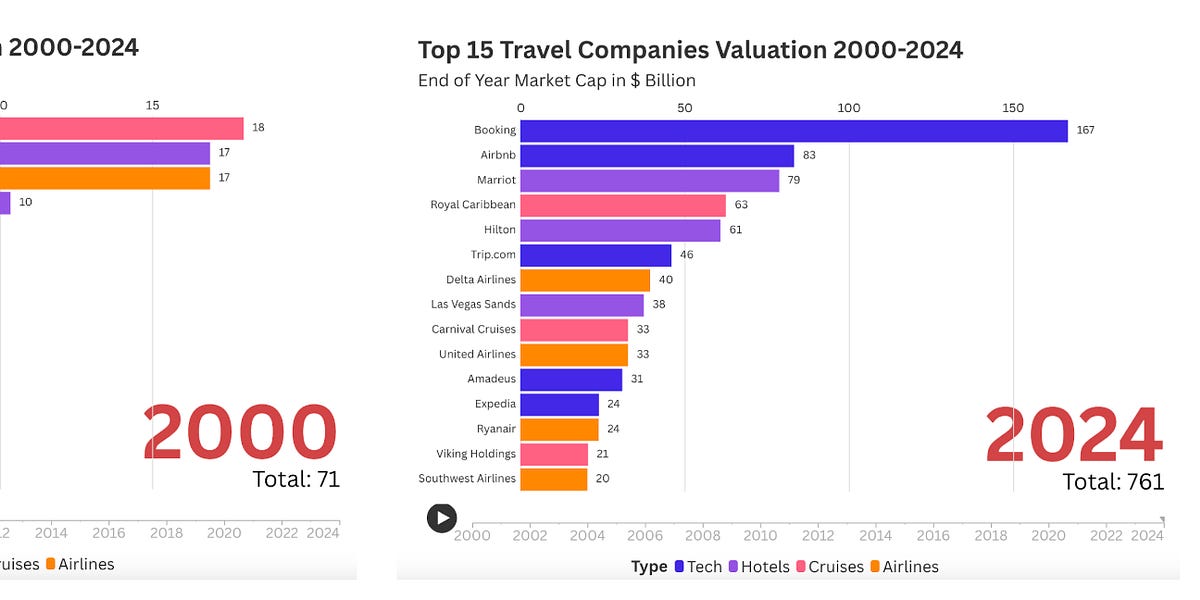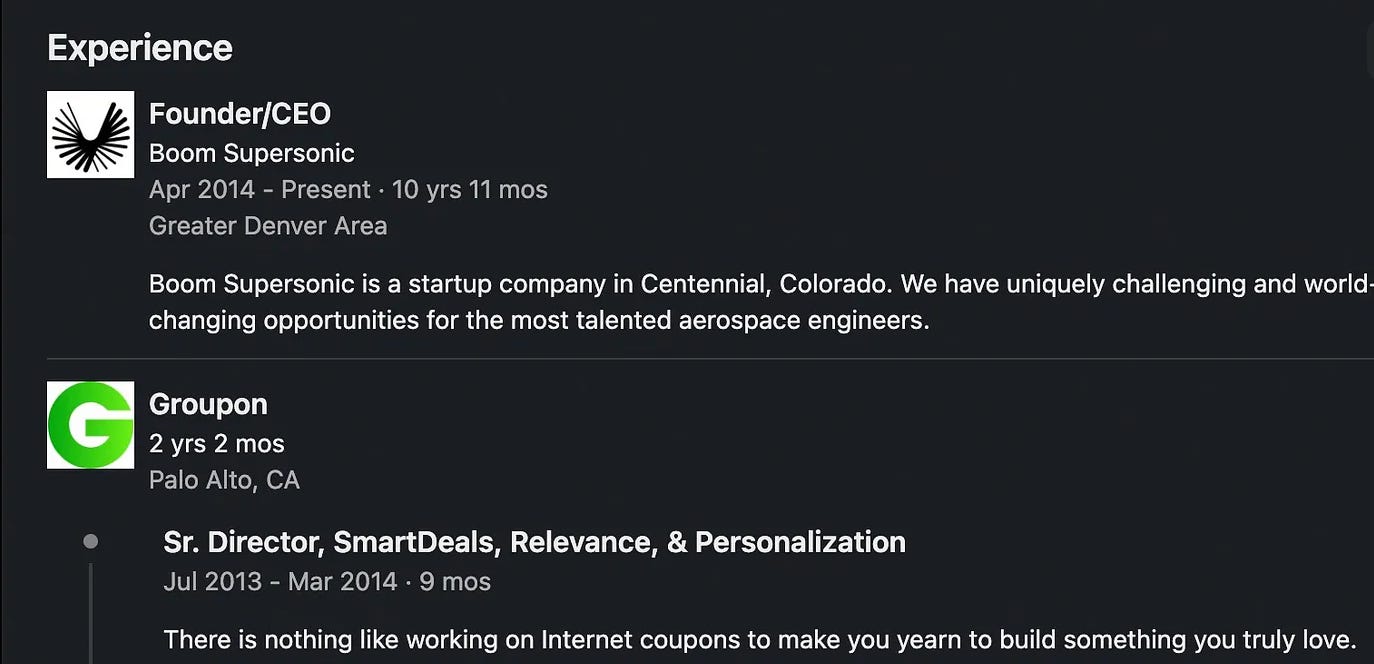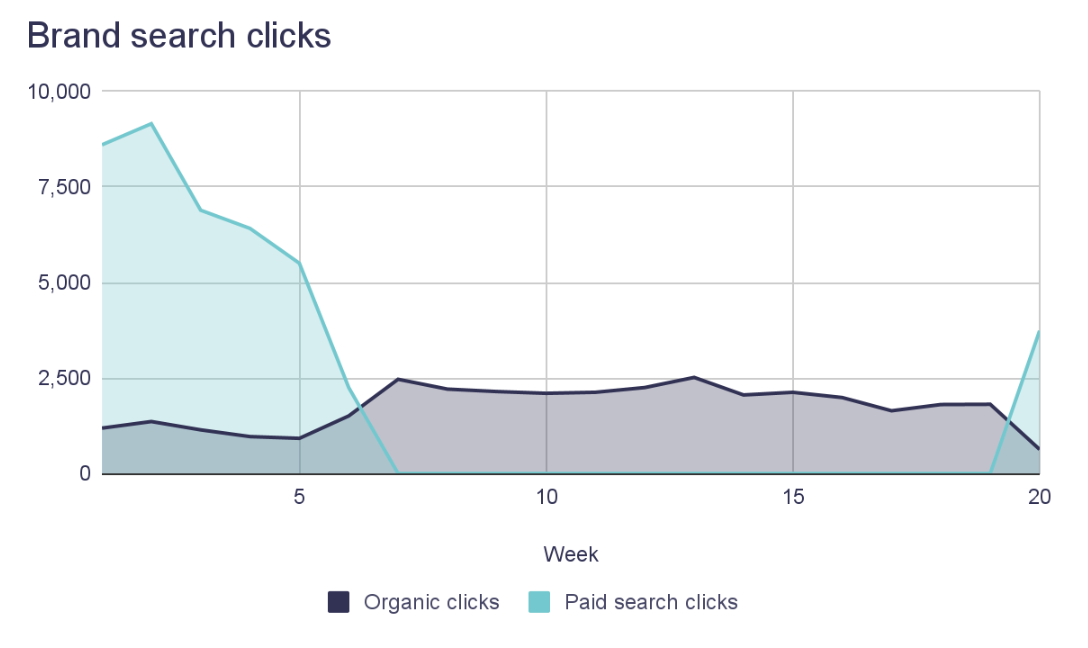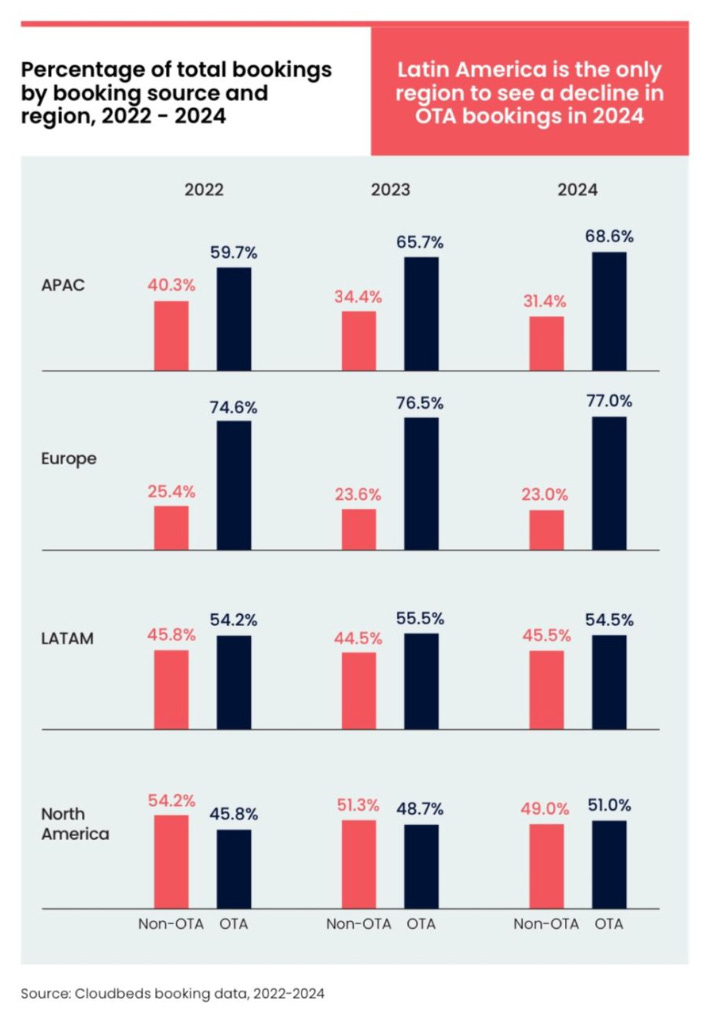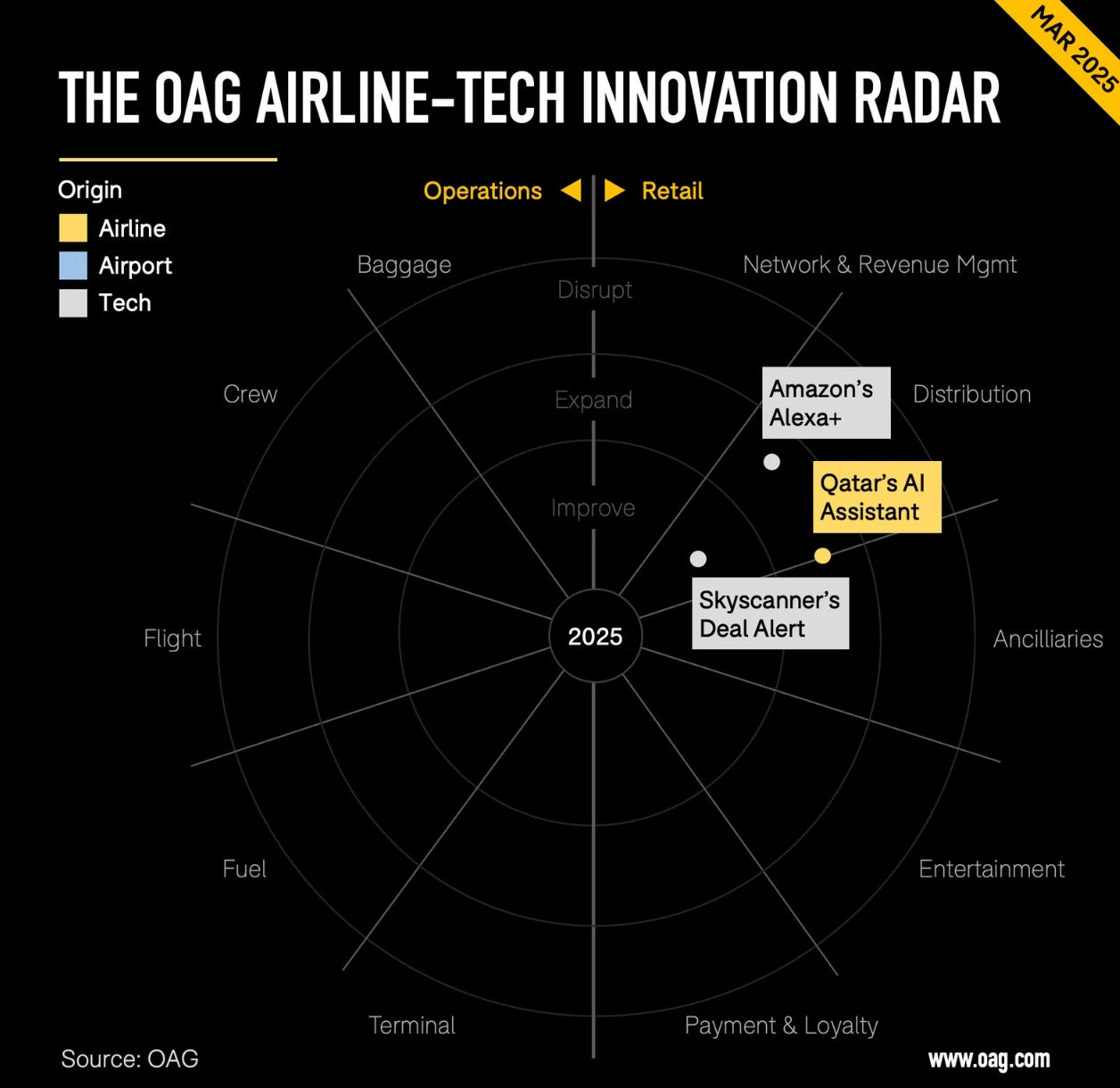Some forces shape the industry, while others shape life. Both of this question are viewed from both. From the network effects that shape our lives to the automation of reshaping airline operations, from the transfer of market leaders to the AI that appears in the traveler experience, to the quiet appeal of cognitive bias, these forces are driving new directions of travel.
because OAG Newsletters to sponsor this version:
From chatbots to Deal Finders, how does technology change aviation this month? This month’s summary Covering AI and automation, reshaping customer interaction, airline operations and traveler experience. These tools are becoming smarter and they are starting to have a real impact on the way travelers search, book and move Read OAG’s Airline Technology Innovation Radar.
The most clicked link in the previous issue was propellic AI Strategy GuideThis is a practical resource for travel marketers adapting to AI-shaped search results.
Mario Gavira (Kiwi.com) Infiltrate 25 years of tourism transformation Through the lens of market value. This guest post includes a sharp timeline visualization, namely, the rankings changed from 2000 to 2000: Who created the greatest value, who lags behind, and how the game develops. If you are building on a trip, or just want to have a clearer understanding of where that value is going, it’s worth your time. Read +.
We all understand the powerful effects of networks in business. Platforms are growing, and value compounds and the strongest nodes are getting stronger and stronger. This post by James Currier (Five-time Founder, Doordash, Angel Investor of Lyft and Patreon and NFX’s founding partner) shows how these same principles apply more powerfully to Our own life.
He introduces the concept of network power that the idea that we are surrounded by those we are surrounded is more complex, thus shaping our decisions, choices, and outcomes that range far beyond our consciousness. It all boils down to 7 key crossroads of life:
-
The family you were born in: Basic network. You won’t choose it, but it defines your early worldview and often sets the first constraint.
-
The high school you attended: Your first peer network. Status, ambitions and identity begin to form here and often persist.
-
University of your choice: A dense network that becomes the launching platform for your future location, career, relationships and mindset.
-
Your first job: SEEDS your professional network and define early opportunities. The person you work for and More important than your job exist.
-
Who do you marry or work with: You are merging the network and their influence touches the way you grow from your life to your children.
-
where you live: Geography determines network proximity, and this proximity greatly shapes the opportunity flow.
-
When you reevaluate: Rare moments are consciously interrupting from the network of the past and making bold direction changes.
Each of these crossroads is locked in a network that shapes the trajectory of everything that follows. It’s a compelling framework, not only about thinking about startups, but about the architecture of your own life.
As we observe our own lives and watch the founders of 100 people move along their own journeys, we further believe that its cyber power will affect most of the ways we live. 90% of these network forces are established only at 7 intersections or critical life events. – James Currier
Boom Supersonic founder Blake Scholl believes that you can finally get a quick trip in prime time. exist This A16Z interviewhe shares how Boom’s XB-1 test jets quietly made history and broke sound barriers No The sound boom attracted the ground audience. Breakthrough, called A tour without prosperitycan unlock supersonic routes that were previously prohibited by regulators.
Scholl’s personal story is fascinating. He burned (without inspiration) in Groupon’s building barcode apps and online coupons, he taught himself aeronautical physics and founded Boom from scratch. Now, they have airline orders, production facilities and next-generation jets (overture) planned to start commercial flights in 2029.
This is one of the oldest questions in paid searches, and Equeco A trial was published Get some answers using travel brand Viajala. They paused brand keyword ads for two months to see what would happen. Organic clicks doubled (expected), but total clicks fell by 60%. Organic earnings do not compensate for the loss of paid traffic, and the impact of revenue is greater than that of advertising.
Equeco also shares that their brand campaigns usually increase ROA by 40% compared to non-brands, enhancing the idea that brand ads still have reliable incremental value even if there is a chance that some clicks will occur organically, especially when competitors bid on your name. Read +.
A few newslettersWhat name (not)“I shared examples of digital tools that are contrary to what they promised. SaharaRose de Vore (founder and CEO of Travel Coach Network) suggests adding more: The Travel Planning App ensures that you don’t know how to plan your trip.
This reminds me of IKEA EffectThis is a cognitive bias, and even if the outcome is not very good, people will be more valuable to what they help create. It appears throughout the process: parents overestimate their children, DIY crafts feel very meaningful, and form surprising attachments for the digital tools they spend their time configuring.
The same dynamics appeared in travel planning. The more we put in to build our own itinerary (spreadsheets, step-by-step Google Map Bookmarks, etc.), the more ownership and satisfaction we may feel on the way. But when an application or AI step in and generate everything automatically, we lose that effort. With that, we lose the pride and personal connection we shape our travels. These tools eliminate friction, but they may also eliminate something more meaningful. Maybe people insist on spreadsheets not because of technology, but because of them think It feels like I have built my own trip.
In a conversation on Lenny’s podcast, SuperHuman founder and CEO Rahul Vohra shares the real secret behind what he calls virality: true virality has nothing to do with clever functions, but with word of mouth.
After LinkedIn acquired his company, Rahul reported directly to Elliot Schmuckler, whose growth leader reported LinkedIn from 25 million to more than 250 million users. Elliot explained in their first one-on-one that no product maintains more than 1 viral factor for a long time. Viral factor is a metric that measures how many new users an existing user introduces. Facebook has reached around 0.7. LinkedIn’s address book import feature (known for actively encouraging invitations) peaked at around 0.4. These are considered to be a lot.
Rahul realized that viral mechanics eventually hit the walls and plateaus. The reason for actually maintaining growth comes down to three things:
-
Word of mouth: Users talk to others without rapid or motivating, just emerge out of real excitement.
-
“Whale”: brings dozens or hundreds of power users of other people. These are not the majority, but they move the needle very much.
-
Excellent product: Very useful or pleasant tools that people want to talk about.
Superman built its entire growth approach around these values. Rather than chasing viral traits, the team focused on building extraordinary things because, as Rahul said, things grow when people share what they like. “Extraordinary” is even one of their core values. This is the principle next to it Create joy,,,,, Provide extraordinary qualityand Build extraordinary. Everyone is designed to make the product so amazing, happy or innovative that people have to tell others.
Max Stakov Shared some insights Global Hotel Distribution Report 2024 from Cloudbeds. In Europe, 77% of hotel bookings online through OTA last year, nearly 10% higher than in other regions. After Asia-Pacific, OTA dependence is 69%. Except for LATAM, all regions have increased OTA dependencies from 2023 to 2024.
Back in 1995, before the Internet reshape hotel was released, only 25% of room nights came from intermediaries. The ratio of direct to indirect booking is 4:1. Today, for many independent hotels, the ratio has been transferred to 1:3, 1:4, or even 1:5, which means that the vast majority of bookings come from third parties.
By contrast, major hotel chains can still drive 75-80% of online bookings directly and maintain a strong 3:1 or 4:1 ratio to support direct channels.
In May, Airbnb will start a new business with $20 billion to $250 million this year, aiming to eventually generate more than $1 billion in revenue. They restart experience (Food tours, cycling, tasting…) A wider focus is not only for travelers, but for locals. No matter where you are, no matter where you are, this is a move towards becoming what to do.
They hire in products, design and engineering and invest heavily in marketing to build visibility and supply. The number of employees will grow by 10%. A large part of this marketing drive is focused on helping Airbnb compete with players like Viator and Getyourguide. Morningstar’s Dan Wasiolek expects Airbnb to get $10 billion in bookings from experience by the end of the decade. Read + WSJ.
The latest news from OAG Aviation technology innovation radar Three outstanding developments in aviation technology have been made this month, each showing how AI and intelligent automation are no longer a buzzword for the future, but are part of the traveler experience now. Qatar Airways is using emotionally aware AI to suggest destinations and meals. Amazon has just put down Alexa+, the assistant of AI-Power, to change the way we book travel. Skyscanner’s new drops feature tracks flight prices, flags drop to over 20%, and sends daily alerts so travelers don’t have to continue checking.
This fictional short story Daniel Stecher’s author is anyone who once asked for help from chatbots and had nowhere to go. It imagines what happens when the airline CEO tries to rebook his own cancelled flight using a chatbot he once approved. It’s fun, a little painful, and there’s a solid reminder that automation often crashes at the exact moment when people need it most. Airlines are growing very fast, but reliability is still important 🙂
→ Explore all 1,095 open travel tech roles Travel Technology Essentialism Working Committee Now.
💼Employer: List your job openings here Complete this quick form
📩 For monthly updates to the latest roles, please subscribe Travel Technology Work Newsletter
If you are a startup looking to raise a round (from seed to series D), I can help (free). Travel Investor Network is a private platform where I recommend innovative travel startups to investors and innovators. If you are interested, please first Complete this form.
If you like travel tech essentialist, consider sharing with your friends or colleagues. If you have not subscribed yet, please join us:
And, as always, thank you for trusting my inbox.
Mauricio Prieto
